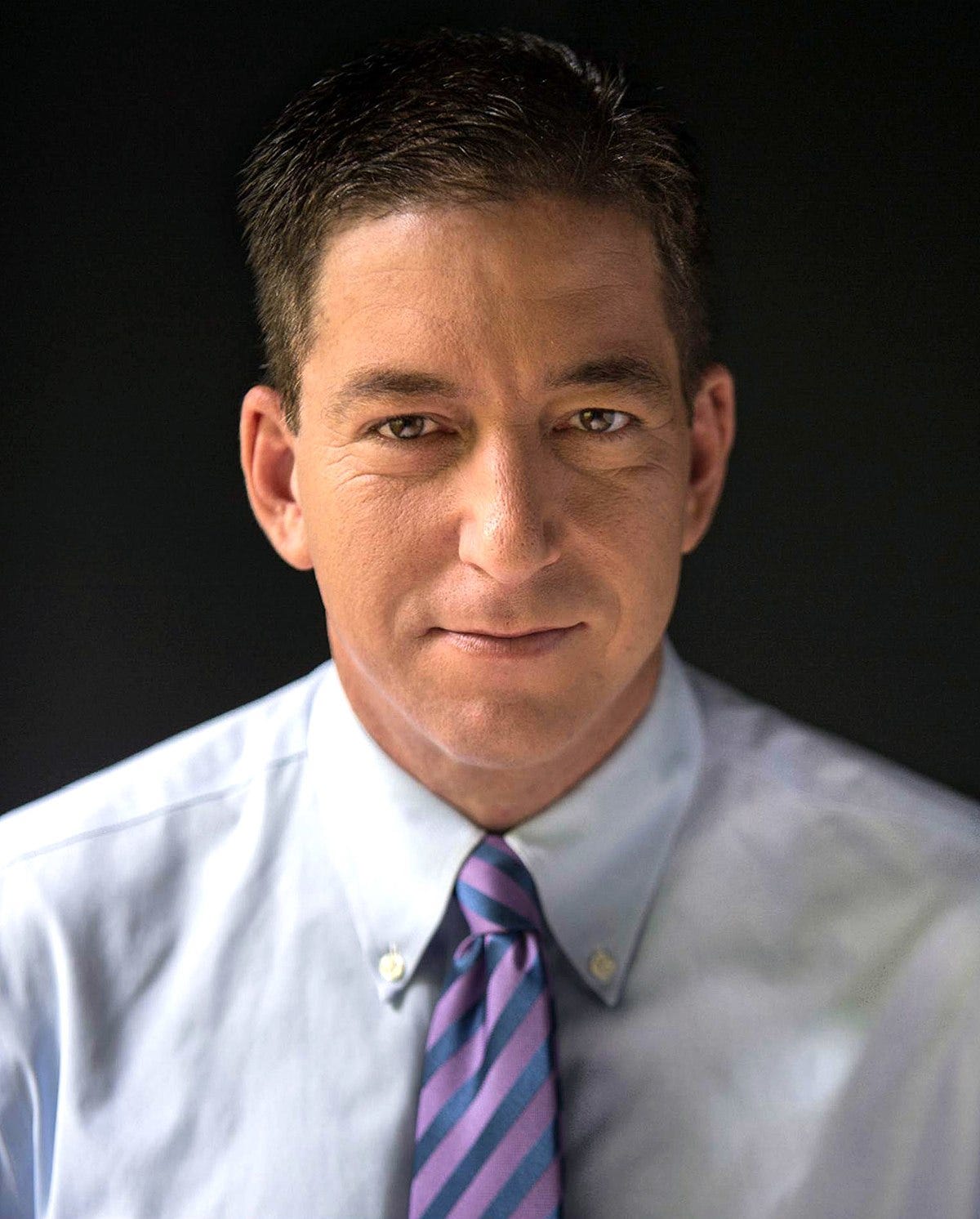Hello folks, welcome to the relaunch of the Inside The Newsroom podcast! It’s been a while since I got the microphone out, but I’m back and will be podcasting with a top journalist at least monthly from now on.
What better way to get back on the horse than have Glenn Greenwald on the airwaves, who the New Statesman recently described as among the greatest journalists of all time. We talked about what it’s like being Glenn, the mental toll of having the U.S. and Brazilian governments after you, the corporatization of journalism, where to start when writing a New York Times bestseller, and Glenn’s best advice for today’s journalists.
Say what you like about Glenn, but it’s hard to match his achievements. He believes what he believes, and will quite literally risk his life to defend his position.
“You go into journalism in order to do stories like this. If you want to be universally beloved and applauded by people in power, journalism is not the profession to choose.”
Earlier this month we celebrated the one-year anniversary of our subscription model. Read all about everything we’ve done so far, and everything we plan to build over the next 12 months. And be sure to check out my Q&A with Walt Hickey, senior data editor at Insider and founder of the Numlock News newsletter. Walt was incredibly candid about what it takes to build an audience and run a profitable business.
And lastly, we relaunched Data Corner and Election Dissection last week! Read about how the top newsrooms covered the Taliban’s takeover of Afghanistan from a data viz angle, as well as the latest on the consequential recent elections in Morocco and Norway.
Okay, let’s do this thing! Podcast is up top, and my post-game analysis and Job Corner are down below… Enjoy!
Job Corner ✍️
We have more than 2,500 jobs and more than 300 internships listed in 1,000+ cities across the U.S., UK and Canada. Below is a preview of the openings you’ll have access to when you subscribe. If you’re a paying member, your jobs sheet link remains the same each week.
Interested in a free week’s trial? Reply to this email and we’ll hook you up!
Who Is Glenn Greenwald?
Glenn is a journalist, former constitutional lawyer, author of four New York Times bestsellers, and co-founder of the Hope dog rescue shelter. In 1996, Glenn co-founded his own law firm in New York City, concentrating on First Amendment and civil rights. In 2005, he became bored of being a litigator and travelled to Brazil to “figure out what I wanted to do with my life”. He immediately fell in love the country and met his now-husband: Brazilian congressman for the Socialism and Liberty party David Miranda. They currently reside in Rio de Janeiro.
Around the same time, Glenn started his own blog and began writing about mass surveillance and the changes around civil liberties in the aftermath of 9/11. In 2007, he was hired as a columnist by Salon, and then joined The Guardian in 2012. It was there that he, along with fellow friend of the podcast Ewen MacAskill, broke arguably the most impactful scandal of this generation: The Edward Snowden CIA leaks.
From there Glenn co-founded The Intercept in 2014, but resigned in October 2020 over editorial freedom. You can read all about why Glenn did so here, as well as a rebuttal from The Intercept’s editor-in-chief, Betsy Reed. Today Glenn writes about a myriad of topics on Substack, and is always an engaging follow on Twitter. Oh, he and David currently have 26 rescue dogs too.
Securing Democracy and Car Wash Scandal
Glenn’s latest book, Securing Democracy: My Fight for Press Freedom and Justice in Brazil, was published earlier this year. It details the events that led to Brazilian President Jair Bolsonaro indicting Glenn for his involvement in the Operation Car Wash scandal, arguably the biggest corruption scandal in history. The scandal saw former Brazilian president and clear favorite in the 2018 presidential election Lula da Silva imprisoned, which allowed Bolsonaro to sweep to victory.
In 2019, Glenn was contacted by Manuela d’Ávila, a centre-left candidate for vice-president in the election. D’Ávila had been approached by a source who had hacked a trove of phone calls between some of Brazil’s most powerful judges and prosecutors. One of those judges oversaw the Operation Car Wash anti-corruption probe that dominated Brazilian politics for the five years prior. The impact of Glenn’s reporting was explosive.
Video: Glenn Greenwald on the Leaked Brazil Archive Exposing Operation Car Wash
A judge ultimately dismissed the indictment against Glenn, but made clear that he would have accepted it, had it not been for an earlier Brazilian Supreme Court ruling. The ruling stated that any attempt to retaliate against Glenn for his reporting would be barred by the Brazilian constitution and the press freedom guarantee it provides.
In our podcast, Glenn talked about how in 2013, Brazil’s parliament was favorable towards him after he exposed the U.S. government’s spying efforts on Brazil amid the fallout from the Snowden CIA leaks. But as Glenn’s husband poignantly pointed out, the Car Wash scandal was completely different and presented more dangers. Aside from now having a truly authoritarian president after him, this time around the folks coming after Glenn were on his doorstep. Having not one but two national governments after you is pretty terrifying, and one can only wonder about the mental toll that will have. The book is a timely reminder of the fragility of democracy.
Corporatization of Journalism
Glenn’s been a writer for the better part of three decades. As anyone who’s followed his work will know, he argues vehemently against the corporatization of newsrooms — the move toward an increasingly corporate ethos and structure. That’s why he co-founded The Intercept — to become an adversarial newsroom and not a subservient one — and is why he’s now completely independent on Substack. But you haven’t had to be in the game as long as Glenn to witness what he’s talking about.
Large corporations have taken advantage of overall falling revenue in journalism, and have applied their ideology of cutting costs to boost profit. The Hussman School of Journalism and Media at the University of North Carolina at Chapel Hill found that the total number of newspaper owners has declined by 32 percent since 2004, or at an average of 100 newspaper companies per year. More than 2,000 newspaper titles are now owned by the largest 25 companies.
I have a whole newsletter worth of thoughts on this, so I’ll spin them into a separate edition in the future. As you know, I experienced this corporatization first hand through my time at the Wall Street Journal. After slaving away for years building myself a voice and trying to help the journalism community, WSJ gave me a choice: shut down Inside The Newsroom or leave.
As Glenn put it, journalism isn’t a profession as much as it is a tool for anyone to fight injustice. There shouldn’t be a credential system whereby only those from the richest and most established media organizations have the privilege to cover the most important stories. And inside newsrooms, journalists’ voices shouldn’t be silenced because of hierarchy. Journalism is, and should continue to be, accessible to everyone.
Glenn’s Advice For Journalists
We’ll finish with some advice from Glenn for today’s journalists. I asked what his top piece of advice is to navigate today’s industry, and have paraphrased his answer below.
There are a lot of easier ways to earn a living other than being a journalist, especially with the industry’s economic struggles. So make sure you’re entering journalism because of passion. Whether that’s politics, culture, sports, social movements or whatever your thing might be. But passion alone won’t necessarily bring you the success you’re looking for, and along the way you’ll inevitably have to sacrifice something. For many, that means working for an institution. That’s okay and is just something you have to do while you build your audience and pay the bills. But no matter what you do, make sure you always remember and preserve that passion that animated your choice to enter journalism. And even in those dark times of sacrifice, safeguard that passion with everything you have to keep that flame alive and to keep feeding it. Your time will come, so be passionate and prepared for when that time does come.
Thanks for making it to the bottom. If you enjoyed today’s newsletter and podcast, please consider supporting what we’re building at Inside The Newsroom. 🙏
















Share this post